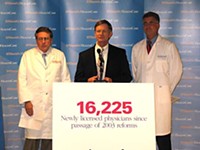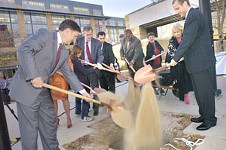The Operation Was Successful ...
The jury's still out on Texas 'tort reform' but the courtroom door is closed
By Michael King, Fri., Sept. 3, 2004
Gov. Perry took that message on the stump last week, delivering a series of speeches around the state on a turnaround he described in glowing terms. "Because of major reforms to medical liability laws that I worked with legislators to enact and that were approved by voters, health care is on the mend, patient access is improving, insurance costs for hospitals are down by 17%, and lawsuits against doctors and hospitals have dropped precipitously."
The governor was referring to House Bill 4 and its constitutional amendment offspring, Proposition 12, which capped at $750,000 the amount of noneconomic damages available to an injured party in a medical malpractice lawsuit. "Today, a doctor in a malpractice case is liable for no more than $250,000 in noneconomic damages, such as the often ambiguous 'pain and suffering' award," the governor continued. "Total liability for noneconomic damages for a specific incident, including hospitals, cannot exceed $750,000."
Perry went on to say that a couple of big hospital chains – Christus Health and Hospital Corporation of America – are between them saving $48.5 million this year in "liability costs" and say they are reinvesting much of that money in new doctors, better services, even indigent care. What he did not say is that the doctors themselves have enjoyed little in "liability savings," beyond the 12% rate reduction by one carrier, the Texas Medical Liability Trust – a cut that followed a 140% increase and that was made as part of the public relations package that sold Proposition 12 itself.
Perhaps Perry's omission was inspired by Texas Insurance Commissioner José Montemayor, who told a legislative committee earlier this year that 60% of Texas doctors had thus far seen no reduction in their malpractice rates – despite his earlier assurances that passing Proposition 12 would inevitably mean a 17-19% cut for doctors. Confronted by angry lawmakers – who hadn't earned their surprise – Montemayor said doctors should be glad rates are now "stable."
Yet even that isn't true. This year, another major carrier tried to increase its rates dramatically, and when the request was denied, began reclassifying its doctor-clients in order to bump their premiums.
Promises vs. Profits
So it goes in the wacky world of Texas public policy, where the problem at hand used to be the rates charged to doctors by insurance companies – whose reported profits went up more than 225% between 2002 and 2003. The solution was to blame injured patients and handcuff their lawyers. Dan Lambe of Texas Watch offers a summary of the results that's less enthusiastic than the governor's. "The important measures of the impact of Prop. 12 are not whether hospitals and insurance companies are making more money, but whether promises are being kept to Texas doctors and Texas patients," says Lambe. "Texas families were promised lower health care costs, improved quality of care, greater access to healthcare, and lower insurance premiums for their family doctors."
Instead, Lambe notes, "Rates are higher, health care costs are up, underserved areas are still underserved, dangerous doctors are still practicing, and the only beneficiaries are the special interests who bankrolled the campaign – insurance companies, large hospitals, and HMOs."
Again, even that is only part of the story. The rest is hidden within the law's casual lumping of a doctor's $250,000 liability with that of a hospital or nursing home or similar corporation. A child, a nonworking spouse, or a retiree injured or killed by medical negligence can't show much in the way of lost wages or other "economic" damages. That often means an attorney can't afford to risk taking on a complex and expensive litigation with little expectation of payment for himself or recovery for his client.
"The governor's celebration of reduced costs for hospitals ignores the fact that the limits [on damages] have an enormous human toll," says Tom "Smitty" Smith of Public Citizen. "The injured cannot be compensated for their injuries, and there is also a continuing civic cost, when the society as a whole must accept the responsibility for which the doctor or the hospital should have been held responsible."
Priceless
Austin attorney Oscar San Miguel specializes in medical malpractice, and says he's already turned away half a dozen potential clients this year not because of lack of evidence, but because even had they won their lawsuits, he couldn't assure them sufficient recovery to make the effort worthwhile. "Talking about it in objective economic terms sounds really cold," San Miguel said. "But I can't get to a jury without research or medical experts, and that can cost $100,000 to $200,000 a case. If I can't show future economic damages, and the noneconomic damages are capped, I've got to look at whether my client is going to receive anything at their end."
Among his current clients is Angie Mesa of Pflugerville, who lost her 4-year-old daughter, Monica, after a bout of the flu that turned into pneumonia, 16 days in intensive care, $500,000 in medical bills, and a series of increasingly desperate procedures that may have included misdiagnosis and negligence. Mesa can barely tell Monica's story without weeping, but the missing and contradictory information from the hospital – including unconfirmed warnings of a possible genetic disorder that could threaten her 2-year-old, Natalie – finally moved Mesa to give the hospital a required notice that she was considering legal action. At that point, all information stopped.
"I don't even care about the money," Mesa says. "But my daughter was a child with 'no economic value,' and I want to know what happened to her. We want answers – and the hospital won't talk to us. Without legal action, they have no incentive to tell us anything."
Mesa's first attorney said her daughter's case is simply not "economically viable" – "they told me they won't take a case where the lawyer will make more money than the client." San Miguel says he remains uncertain how he will proceed. "I don't think the hospital would have told her anything anyway, but I'll do what I can. I can probably get her some answers, but it may not lead to a case."
I suspect when Gov. Perry announced the "good news" about medical malpractice reform, he hadn't talked to many people like Angie Mesa. But perhaps her sacrifice, and that of her daughter, was necessary to protect the profits of insurance companies in Texas, and to lower the liability costs of health care corporations. That would mean, at least, that her loss was economically viable to someone. ![]()
Got something to say on the subject? Send a letter to the editor.










